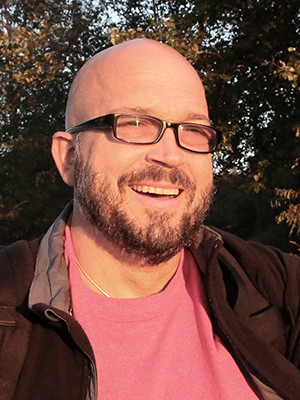
Image courtesy Michael Dabrowski, all rights reserved.
Michael Dabrowski is a Spanish educator who has been incorporating Wikipedia in his classrooms. His many other titles include Academic Coordinator of Spanish at Athabasca University and a Spanish Sessional Instructor at the University of Calgary, former president of the Canadian Network for Innovation in Education (CNIE-RCIE), project lead of the Spanish Open Educational Resource (OER) Initiative, and a doctoral student in the Ed.D. program at Athabasca University specializing in online education using OER.
Recently, Wiki Education partnered up with the Global OER Graduate Network (GO-GN) to host an OER Wiki Scholars course to improve the coverage of OER topics on Wikipedia. Dabrowski heard about this as a member of GO-GN and knew seizing this opportunity would help others learn more about the OER movement.
Because of Wikipedia’s boundless array of information and resources about its internal workings, it can be difficult for an individual to learn the ins and outs. With the Wiki Scholars course, however, Dabrowski became prepared to contribute information about open pedagogy to the encyclopedia.
“A well structured course that steps you through the aspects of the Wiki world really helped me not get overwhelmed by the complexity and empowered me to see myself as a Wikipedian rather than just a Wikipedia user,” says Dabrowski.
Dabrowski appreciates Wikipedia’s commitment to public knowledge and how the community strives for language inclusivity.
“I felt the potential for global reach of my words and the ability to improve something, even one word at a time. Often we feel like the world is spinning around us and we have no sense of agency. Wikipedia gives us all a voice in shaping global knowledge,” says Dabrowski. “It feels good to be able to synchronize versions across multiple languages ensuring that one language does not have a great article while others only have stubs. I guess this is the equivalent of linguistic democratization of knowledge.”
Dabrowski believes that awareness is key when informing his colleagues about the significant impact Wikipedia serves. The Wiki Scholars courses can teach other professionals how to edit Wikipedia, thus breaking the chain of associating Wikipedia with “untrustworthy” information.
“There are very few times in our lives when we are fully empowered to make something better when we see it is inadequate,” says Dabrowski. “If every academic took a term or two and poured all of their research and knowledge into it, Wikipedia would be full of excellent, up-to-date articles. I think academics are a particularly well suited group to court in the future to enhance Wikipedia and its impact on global knowledge.”
Throughout the course, Dabrowski delved into genuine conversations with other Wiki Scholar participants, allowing him to learn many new diverse perspectives.
“The discussions with peers from all around the world that I interact with fairly regularly really helped dig into Wikipedia itself,” says Dabrowski. “I would imagine that having a very diverse group would make it tough to create synergies between contributors and would provide less benefit to the learners. Our discussions were passionate and we were all on the same page and could scaffold each others’ knowledge. It was a very empowering experience.”
As for the future of Wikipedia, Dabrowski strongly advocates that “truth” should not be favored on a hierarchical basis but rather be a collective of multiple perspectives.
“I am a strong believer in objective facts, so perspectives benefit from creating an encyclopedia of human knowledge by making sure that we are not looking at the truth through only one lens that has a bias, something we all tend to do individually,” says Dabrowski. “I think the real issue is to have representative editorship from all the diverse communities. I fear that this will take a lot of time and work as the inequities between the richest and poorest in this world are growing.”
Knowing how contributions on Wikipedia work, Dabrowski plans on continuing to incorporate aspects of Wikipedia into his classrooms such as assigning students to edit certain articles, which he can do as a part of Wiki Education’s Wikipedia Student Program.
Dabrowski believes that the existing strong correlation between open educational resources and Wikipedia make his own contributions a notable “down payment for the future,” he says.
To take a course similar to Michael’s about how to edit Wikipedia or Wikidata, please visit learn.wikiedu.org. Image credit: ParsonsPhotographyNL, CC BY-SA 4.0, via Wikimedia Commons
